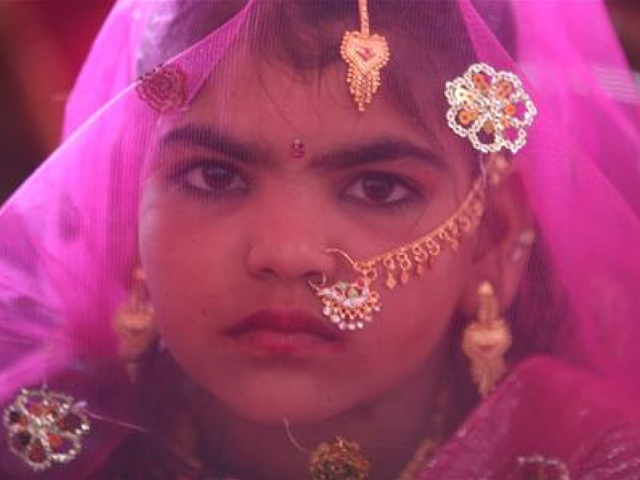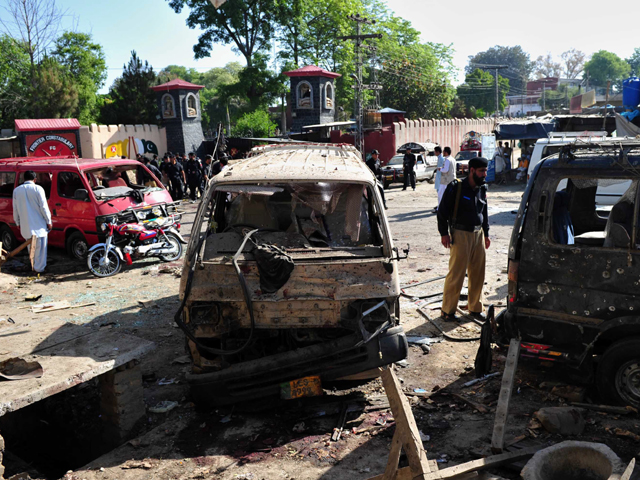
World Teachers’ Day and Pakistan’s education crisis
Let us not forget Pakistan’s 1.4 million teachers in the public and private education sector.
Nations all over the world are celebrating World’s Teachers’ Day. I too, took part in the celebrations, and sent wishes to some of my most inspiring teachers on this very special day. However, I began by first mailing a motivating token of appreciation to... myself.
And why shouldn't I?
I remember October 1 2003 vividly when a fresh, barely out-of-college young girl stood in a class of 40 ninth-graders. I was clueless, to put it mildly. I felt like Alice in Wonderland, prey to all sorts of student pranks and innocent to the naughtiness of children.
I discovered that I had to teach science to fourth graders too.
For the next week or so I found myself solving the mysterious case of missing erasers, sharpening colour pencils and helping the children learn the name of the planets. From joining them in marveling over the germinated shoots of a small cotton-embedded bean in a jam jar to actually learning to appreciate their heart-warming smiles and warm hugs, being a school teacher could never be better.
While the world celebrates teachers for providing quality education at all levels on October 5 every year and while we send out our greetings to our most beloved teachers, let us also not forget Pakistan’s 1.4 million teachers in the public and private education sector. These teachers constitute a formidable workforce of the country, and they, despite their meager resources continue to nurture and promote education in Pakistan.
Even though Pakistan is celebrating 2011 as the Year of Education, one cannot shy away from the most pressing long-term challenge in the country – the education crisis.
[[http://www.youtube.com/watch?v=AlhCcYn2Ulk]]
The 18th Amendment Act 2010 makes education a fundamental right for all Pakistani citizens, however, one in ten of the world’s out-of-school children is a Pakistani. To put this in numbers, a staggering 25 million out of Pakistan's 70 million 5-to-19-year-olds are not in school.
Considering that Pakistan's population is profoundly youthful - with a median age of 21 - one can very well interpret the impact when this bulk of largely uneducated youth, with limited skills, will enter the workforce in the next 10 years. In the meantime, if the country’s population, estimated at about 175 million, continues to grow at the same rate, it will rise to 275 million by 2050. Under such circumstances, the future of this add-on youth population is anybody’s guess.
It is high time that a country like Pakistan, that has seen multiple advancements, pays heed to the educational sector. Pakistan spends roughly $4.5 billion a year on its military and less than $400 million on education. Social sector services like education, health care, clean water, social protection, and police services seem to be the least of Pakistan’s priorities.
To overcome these challenges, analysts believe that Pakistan needs to revamp its educational system – a herculean task by all measures. Our elite will have to give up on their age-old belief that they can benefit from the sustained illiteracy of the Pakistani people.
On a non-governmental scale, lots of commendable work is being done to address the education issue in the country. Philanthropic organisations like The Citizens Foundation have been actively involved in providing quality education to the less-privileged children across the rural and urban slums of Pakistan. With its 730 school units in 83 towns and cities, The Citizens Foundation teaches 102,000 students in the remotest parts of the country and has successfully built a model of imparting quality education at ‘Pay as you can afford’ structure. Equally commendable is its vast network of 5,400 all female teachers who travel long distances to far-flung areas; be it the rough terrains of Balochistan or the traditionally conservative Khyber Pakhtunkhwa communities. Encouraging female enrollment and striving to maintain a 50% female ratio in most of its campuses, TCF has to-date created 8,000 jobs in communities in which it operates, thereby fulfilling its vision of greater productivity on a national scale.
Similarly, UK-based Rural Education and Development Foundation (READ) runs over 330 schools with more than 70,000 children, 3,500 teachers and over 7,000 orphans. Operating in the rural areas of Pakistan and in Kashmir, READ foundation is making a significant contribution to help Pakistan fulfill the United Nations Millennium Development Goal to achieve universal primary education.
However, not all can be left to philanthropists. The crisis of the Pakistani educational sector cannot be stemmed by non-governmental organisations alone. This issue requires immediate government’s attention. Let’s not forget that nations that are worth speaking about today have been built by an educated work force and multiple generations of educated children.
I am grateful to all my teachers who enabled me to think, write, speak and make a living out of it; no words will ever match my gratitude for their efforts. It is now up to us to ensure that the small shoots from the cotton bean grow into strong trees.




COMMENTS (10)
Comments are moderated and generally will be posted if they are on-topic and not abusive.
For more information, please see our Comments FAQ